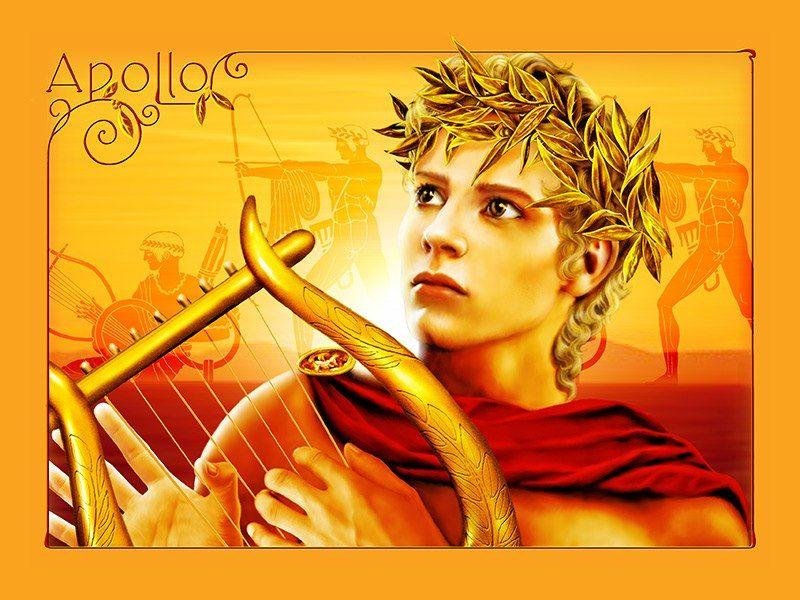Crop it! is a greek gods musical that guides you through how to make your own original 1980s synthesiser based pop music. It’s a universal story of friendship, creativity and the power of music to bring people together. It’s a unique theatrical experience utilising immersive video, live performance and polyphonic soundscapes. It’s like nothing else you’ve seen before.
In this article, I will talk about “Greek Gods Musical”. Let’s start.
What Is Apollo The God Of?
Apollo And Music
Apollo And Music
Apollo is the god of music and poetry. He is also called Phoebus, which means “bright,” because he was so bright and beautiful. Apollo had many different roles in ancient Greek myths and legends: he was a god of light and warmth, a god of healing, a god of prophecy, a god of music and poetry, and even a god of medicine!
Apollo was born on Mount Olympus. His mother was the goddess Leto (pronounced LEH-toh), who lived on Mount Cynthus with her husband Zeus (pronounced ZOOS). When Leto became pregnant with Apollo, she could not find anyplace to rest except for floating islands in the sea between Greece and Crete.
When he grew up, Apollo became known as a beautiful youth. People called him “Phoebus” because he looked like the sun shining down from heaven onto earth. But there was something else about him too: he had an incredible voice that could make people feel happy or sad just by singing them songs!
Apollo And Education
Apollo and Education
Apollo was the god of music, medicine, and healing, but he was also known as the sun god. Apollo’s mother was Leto and his father was Zeus. Leto gave birth to Apollo when she was floating on the water in a palm leaf boat in the middle of winter. She landed on an island called Ortygia and gave birth to Apollo there.
Apollo was born with a lyre (a stringed instrument) and played it beautifully. He also had a bow and arrows that no one else could use because his fingers were too delicate for them. The arrows could go anywhere without fail, even if they were blindfolded or bound by chains. As a teenager, he went hunting with his brother Artemis (Diana) and accidentally killed her favorite stag (a male deer). Artemis was so angry that she cursed him so that he would never have any joy in life.
Titles For Apollo
Apollo is the god of music, prophecy, light and knowledge. He is the son of Zeus and Leto, sister of Artemis. He is also known as Phoebus Apollo, which means “shining”.
The name Apollo means “shining one”, or “bright” or “pure”, derived from the Greek word apellon (to shine). In Greek mythology he is known as a healer and protector god, who was born on the island of Delos. His parents were Zeus and Leto (daughter of Titans Coeus and Phoebe).
His symbols are the bow and arrow; lyre; tripod and a shepherd’s staff with golden ears.
Apollo was also known for being able to bring good fortune and healing powers to those who worshipped him, as well as being able to drive away evil spirits. He was responsible for curing diseases caused by ordinary people who had displeased him in some way (by having sex during their menstrual periods), although he could not cure diseases caused by Zeus himself (such as plague or leprosy).
Apollo’S Appearance
Apollo was the god of music, poetry, and prophecy. He was also a healer and a protector of young children. His appearance was striking: He had long, golden hair and a radiant smile. His tunic was decorated with stars that twinkled like diamonds in the night sky. He could be known to wear the laurel crown, which symbolized victory in battle.
Apollo’S Personality
Apollo is a very calm and peaceful god. He loves to play his lyre, make beautiful music, or listen to others sing or play an instrument. He is also very kind and generous to his followers. Apollo is not as straightforward as some of the other gods though; it can sometimes be hard for him to make decisions.
Apollo has the most beautiful appearance of all the gods. He is tall and slim, with golden hair and eyes like stars. His skin is ivory white and his robes are made from pure gold.
Apollo is the god of light and music, so he often appears at dawn in a chariot drawn by white horses. He carries a lyre and wears a crown made from leaves and vines.
Apollo’S Powers
One of Apollo’s most important powers is his ability to heal people who have been injured or sick. He can also turn men into animals by shooting arrows at them, which is why he is sometimes called Phoebus (‘shooting an arrow’).
Apollo is also known as the god of prophecy because he could see into the future. He would give prophecies through his Oracle in Delphi, which was a temple where people could go to ask questions about their future or about things that had happened in the past.
Myths About Apollo
The Birth Of Apollo
The Birth Of Apollo
The Birth of Apollo is a musical comedy in two acts, with music by Sigmund Romberg and Peter De Rose and book and lyrics by Oscar Hammerstein II. The musical was an adaptation of the story of Cupid and Psyche as told in Apuleius’s The Golden Ass. It was produced by Florenz Ziegfeld, Jr. and opened at the New Amsterdam Theatre on Broadway on December 26, 1919. The production starred Alfred Drake as Hennessy and Olive Moore as Diana, with songs by Sigmund Romberg (music) and Peter DeRose (lyrics).
The show had its first production in London at the Lyric Theatre on 28 January 1920. It starred Alfred Drake who had played the role on Broadway. It was revived at The Old Vic in 1956 starring Laurence Harvey as Hennessy and Patricia Kirkwood as Diana.
The Birth Of Apollo
The story of the birth of Apollo is one of the most famous in Greek mythology. The god’s father was Zeus and his mother was Leto, a Titaness who was banished from Olympus after she gave birth to two other sons.
Zeus and Leto were both married to other people when they fell in love. Zeus was married to Hera, who he had an affair with before marrying her and Leto was married to Kephalos, who wanted nothing more than for his wife to bear him a son. After several attempts at conceiving a child, Leto’s prayers were finally answered when Zeus agreed that she could have her own island on Earth where she could give birth without fear of Hera’s wrath.
Zeus gave Leto a magical golden chair which would float on water as well as transport her anywhere she wished to go without having to walk or ride on horseback. The only condition was that it could only be used one day every year during which time no man would be able to see her or else face certain death.
The first day that Leto left Olympus was on the seventh day of spring when the wheat sprouted from its winter dormancy and flowers bloomed everywhere in nature.
Apollo And The Killing Of Python
Apollo And The Killing Of Python
The story of Apollo and Python is one of the most unusual stories in Greek mythology. It tells of how Apollo was forced to kill his own mother, Leto, in order to save her from a giant snake called Python.
The story begins with Zeus, who had been sleeping with Leto while she was still married to the river god Asterion. When Hera found out about this she became very angry and decided to take revenge on Leto by making her suffer as much as possible during her pregnancy.
So Hera sent two huge snakes down from Mount Olympus to attack Leto when she was at her weakest point – just before giving birth. The first snake attacked Leto just before she gave birth to Artemis (who was born fully grown and ready for battle), but Leto managed to escape thanks to the help of Gaia (Mother Earth).
When the second snake attacked Leto during childbirth, she managed to escape again thanks to Hermes who turned into a tortoise so that he could hide under a rock where the snake couldn’t reach him. Eventually Hermes turned back into himself again and killed the second snake by throwing stones at it until it died.
Apollo’S Weapons, Animals, Temples
Apollo is the god of light, music, and healing. He is the son of Zeus and Leto and twin brother of Artemis. Apollo has been worshipped at least since the 8th century BC, and perhaps even earlier. His sanctuaries were established in the most important places in Greece such as Delphi and Delos.
Apollo was depicted as a handsome youth with long hair, holding a lyre (a stringed musical instrument).
Apollo’S Weapons, Animals & Temples:
Apollo’s main weapon was his bow (called a “kithara”).
His sacred animal was the snake Python.
In ancient times there were many temples dedicated to him throughout Greece.
Apollo is the god of music, archery, healing, plague, poetry and prophecy in Greek mythology. He is the son of Zeus and Leto, and has a twin sister named Artemis. He is often depicted as a young man with a lyre or bow. His symbols include the golden bow and arrow and the tortoise.
Apollo’s Weapons:
Bow and Arrow – Apollo was known as the god of archery, as well as music. When he shot his arrows at enemies he would also sing songs to them to lower their defenses before they were hit by his arrows.
Golden Bow – This was Apollo’s primary weapon that he used when he shot his arrows at enemies. This bow was said to be made from wood from a tree on Mount Olympus which had been struck by lightning and broken off from its trunk. The wood from this tree became so beautiful that it glowed like gold when it was polished, thus giving it its name “golden bow”.
Harp – Apollo would often play songs on his harp during festivals honoring him or other gods and goddesses such as Dionysus or Aphrodite so that people could dance along with them while listening to these songs being played on his instrument!

Zeus Punishing Apollo
Zeus Punishing Apollo
Zeus is the King of the gods, and God of the sky and thunder. He was the son of Cronus and Rhea. Zeus ruled Mount Olympus with his wife Hera, who was also his sister. He frequently fell in love with human women, including Callisto, Semele and Alcmene. He often disguised himself to try to win their affections. His many children include Ares (with Hera), Hephaestus (with Hera), Athena (with Metis), Hermes (with Maia), Persephone (with Demeter) and Dionysus (with Semele).
The god Zeus punished Apollo for killing Python by sending him to live amongst the mortals. Zeus had a strong sense of justice and hated anything that was not fair or just. This is why he punished Apollo for killing Python without due cause or reason.
Zeus Punishing Apollo
The ZEUS PUNISHING APOLLO mosaic is one of our most popular artworks. It features the Greek god Zeus punishing his son Apollo after he failed to capture the sacred cows of the monster Typhon. The Greeks believed that a punishment by Zeus was the worst thing that could happen to a mortal.
The mosaic is a copy of a work by the ancient Greek painter Philoxenos of Eretria, who lived between 370 and 320 BC. It dates back to 340 BC and is currently on display at the National Archaeological Museum in Athens, Greece.
Apollo And The Nymph Daphne
Apollo and the Nymph Daphne
Apollo was a god who had many loves, but his passion for Daphne was greater than any other. Although he pursued her relentlessly, she never gave in to his advances. One day Apollo saw Daphne bathing in a river and, overcome with desire, tried to rape her. As he attempted to force himself on the nymph, she cried out for help and was transformed into a laurel tree. Apollo took up the laurel branch and dedicated it as a symbol of victory at his games. He then placed the tree in the centre of Delphi where it became sacred to him.
The story of Apollo’s love for Daphne is often interpreted as an allegory of human desire or lust being transformed into something more spiritual and beautiful through art or music (Laurel branches were used to crown winners at the Pythian Games).
Apollo And The Nymph Daphne
The story goes that Apollo was a handsome, young god and Daphne was a nymph. One day, as Apollo was walking through the woods, he spotted Daphne bathing in a stream. He immediately fell in love with her and began to woo her. However, Daphne wasn’t interested in Apollo’s advances. She wanted nothing more than to remain a virgin and live in the woods forever.
Apollo continued to pursue Daphne despite her repeated rejections of him. One day, while Apollo was chasing after Daphne, she ran into some trees that grew around her and transformed into a laurel tree so that she could avoid him. In doing so she became immortalized by Zeus as an evergreen tree that would forever be associated with victory and glory.
Apollo’S Oracle At Delphi
Apollo’S Oracle At Delphi
The Sanctuary of Apollo at Delphi was one of the most important religious centers in ancient Greece. The oracle at Delphi was an inspiration to many writers including Plato, Herodotus and Pindar.
The oracle at Delphi was first mentioned by Homer in the Iliad, but it was not until after Homer’s death that the Greeks began to believe in its powers. The oracle was established around 1400 B.C., but it was not until after 700 B.C. that it became known as the most important shrine in Greece and one of the most famous in the world.
Apollo’s Oracle at Delphi.
Apollo was the god of the sun and music, but he was also the god of prophecy. At Delphi, a sacred site in Greece, he had an oracle that answered questions about the future. People would travel from far and wide to ask Apollo about their destiny. The oracle would give them an answer in the form of a riddle. If they could solve it, they would know what to do next. If not—well, maybe they should have paid more attention in school!
The Oracle was housed inside a temple on Mount Parnassus, which is where Apollo lived before Zeus banished him from Olympus for murdering his son Asclepius with lightning bolts after he resurrected him from death. For centuries afterward, people went there to ask Apollo questions about their future and receive prophecies in return.
Apollo’S Role In Trojan War
Apollo is a god in Greek mythology, the son of Zeus and Leto, and the twin brother of Artemis. He is the god of music, poetry, and prophecy.
Apollo has been variously recognized as a god of light and the sun; truth and prophecy; archery; medicine and healing; plague; music, poetry, and the arts; and more. Apollo is also called Apollon in Greek.
The Oracle at Delphi was one of the most important sites in all of Greece. The oracle was located on Mount Parnassus at the base of a gorge called “the Castalian Spring” where it was said that nymphs lived who could prophesy future events by flowing water into their hands. Apollo’s temple sat above this spring, so he was considered to be its source.
Apollo’s Role In Trojan War
Apollo is one of the most important gods in Greek mythology. His name is derived from the Greek words apollon, which means “destroyer” and the suffix –eus, which means “god”. Apollo was said to be the son of Zeus and Leto, but he was also born on Earth while Leto was on her way to Delphi. He was raised by the nymphs of Chiron until he grew up as a young man.
Apollo had many different roles in Greek mythology. The most notable ones were as god of music and poetry, god of healing and medicine, god of light and prophecy, god of archery and prophecy (especially through his Oracle at Delphi), god of youth, protector of flocks and herds and patron deity of shepherds. He also had many other roles such as being a sun god (the sun is often depicted as an arrow shot by him), god of plague or pestilence due to his arrows being poisonous, patron deity of fishermen and sailors (due to his association with the sea) and so on.
Apollo And Hermes
Apollo And Hermes
The god of music, Apollo, and the god of thieves, Hermes, had a strange friendship. It all started when Apollo was taking a nap after a long day of playing his lyre. Hermes came along and stole his golden lyre. Apollo got so mad that he chased him all around Greece until he finally caught him. He took his lyre back and then made Hermes promise never to steal from him again. Since then, they’ve been friends.
Apollo’s dad is Zeus (the king of the gods) and his mom is Leto (a Titan). Hermes’ dad is Zeus’s brother Hades (the god of death) and his mom is Maia (a nymph).
Apollo was the god of music, poetry, healing and plague. He was the son of Zeus and Leto, a Titaness.
Apollo is known as the god of light, music and poetry. He is also associated with archery, medicine and prophecy. Apollo was the leader of the Muses (a group of goddesses who inspire creativity), which means he was responsible for inspiring people to create beautiful works of art.
The Greeks believed that Apollo would grant them good health if they prayed to him before a battle. It is believed that he also helped people with their eyesight by granting them healing herbs.
Apollo’s attributes include an ox-goad (a stick used to guide cattle), a laurel wreath (symbolizing his victory over the serpent Python), and a bow and arrows (representing his skill as an archer). The Roman version of Apollo had different attributes: he carried a lyre instead of an ox-goad, wore a crown made from grain stalks instead of laurels, and had no bow or arrows.
Heracles And Apollo
The Musical Heracles and Apollo, by Euripides, is a comedy that was performed during the 5th century BC. The story follows Heracles as he tries to complete twelve tasks in order to be recognized as a true hero. In addition to this, he must also compete with his half-brother Iphicles who wants to win the competition in order to become King of Thebes.
The first play that was ever written by Euripides was Alcestis which is about the Greek God Admetus and his wife Alcestis who must die so that he can live. This play was written during the 5th century BC and it is believed that Euripides wrote it after he had read Homer’s Odyssey and Iliad because many elements from those two works are used within Alcestis.
Heracles And Apollo was written after Alcestis and it was most likely performed at the Dionysia festival in Athens around 430 BC. It is believed that this festival took place in honor of Dionysus, who is one of the main characters within Heracles And Apollo.
Periphas
Periphas was the son of Eurymedon and Cleobule, daughter of King Cleobulus of Sparta. His father was a Trojan ally during the Trojan War, who brought eight ships to Troy’s aid. Periphas is mentioned in Quintus Smyrnaeus’ epic poem Fall of Troy (II, 690), where he is said to have been killed by Teucer during the final stages of the war.
Periphas
Periphas was the son of Oileus and Rhene, and husband of Leucippe. He was one of the Seven Against Thebes. He was killed by Antigone.
Periphas was a Theban commander during the Seven Against Thebes, who took part in the battle against Eteocles. He was a son of Oileus and Rhene, and brother of Tydeus. His wife is Leucippe. Periphas is killed by Antigone during the fight with Aletes and Leucippe at the tomb of Amphiaraus.
The story of the musical follows the adventures of Heracles, one of the most popular Greek heroes. After killing his family’s murderer and being exiled, he fights monsters and gods alike to regain his honor and his place in society. The play also features other Greek gods such as Aphrodite, Athena and Hades.
Periphas is a minor character from Greek mythology who was killed by Heracles when he was sent to fetch a golden apple from him. He was one of the sons of Ares, the god of war; this makes him the half-brother of Deimos (fear) and Phobos (terror). He lived in Euboea in Greece with his brothers and sisters, including Aglaurus (brilliant), Alcippe (shining), Oenopion (wine presser), Oeneus (wine) and Thyia (wild).

Apollo’S Role In Nurturing His Children
Apollo is the god of music, archery, medicine and light. He is the son of Zeus and Leto and twin brother of Artemis.
Apollo is one of the most important gods in Greek mythology as he is associated with many things including light, healing, music and prophecy. He was also one of the most important gods in ancient Rome where he was known as Apollo.
Apollo was the son of Zeus and Leto, who was a daughter of Titans Coeus and Phoebe. Leto was pregnant with their children when she had to hide on Earth from Hera, who was jealous that Zeus had other children besides her own. She hid in a cave on Mount Ida near Troy where she gave birth to twins: Apollo and Artemis (Diana).
Zeus later helped them by sending Hermes to bring them food every day while they were hiding on Earth. When they grew up they became powerful Olympians who served their father Zeus by helping him rule over Olympus by doing his bidding or taking care of his interests on earth such as healing people or granting prophecies about the future.
Tityus Vs Apollo
Tityus Vs Apollo
Apollo was the god of music, poetry, and healing. He was also the son of Zeus and Leto. When Leto gave birth to Apollo and his twin sister Artemis, she was attacked by Hera. She sent two giant serpents to chase her away from Earth, so she could not give birth in any of the usual places or it would make Hera jealous. But before she fled, Leto gave birth to her children on an island in the middle of Lake Tritonis in North Africa.
Tityus was a giant who angered Zeus when he tried to rape Leto after she gave birth to Apollo and Artemis. Zeus turned him into a huge vulture with wings that stretched over twenty miles across who was forced to forever eat his own entrails as punishment for his crime against the goddesses, his daughters.
The two were brought together when Zeus decided that he wanted to punish Tityus even further by making him look up at them whenever they passed overhead as they traveled across the sky in their chariots driving away from their island home.
Killing Of Niobe’S Children
Niobe was the daughter of Tantalus, a king of Lydia, and his wife Clytia. She had many children who were killed by Artemis and Apollo. Niobe boasted that she was superior to Leto because she had fourteen children (Niobids) while Leto only had two (Apollo and Artemis).
When the gods heard this impious speech, Apollo killed all of Niobe’s sons with arrows while Artemis shot all her daughters dead with her arrows. Apollo killed them to avenge his mother Leto who was angry at the words that Niobe spoke against her. To make sure that not even one of them survived, he also created a plague which caused seven days of fever and then death.
Niobe fled to Mount Sipylus where she turned into stone as punishment for her prideful words.
Zeus, the king of the gods, was in love with Niobe, a beautiful mortal woman. But when Niobe boasted that she was more beautiful than Leto and had twelve children to Leto’s two, Zeus killed all of Niobe’s children. Niobe, overcome with grief, turned into a rock and wept for her lost children. To this day, she is still weeping at the foot of Mount Sipylus in Asia Minor (modern-day Turkey).
The story of Niobe is told by Ovid in Metamorphoses (Book VI).
Marsyas The Satyr
Marsyas The Satyr
In Greek mythology, Marsyas (; Ancient Greek: Μαρσύας) was a satyr renowned for his skill with the flute. According to Ovid, Marsyas challenged Apollo to a musical contest, which he lost, and as a result was flayed alive in a cave near Celaenae in Phrygia by the winner.
The ancient sources disagree about which instrument(s) Marsyas played. In the oldest artifacts signed by Marsyas’ hand that have been found, he is playing an Aulos or double flute (hole-flute), while in others he is playing a Lyre. Some modern scholars suggest that the two instruments may have been synonymous in antiquity and that Marsyas is shown as playing either one or both in different period artworks.
Marsyas The Satyr
Marsyas was a satyr who challenged Apollo to a musical contest. Apollo won the contest with his lyre and flute, and Marsyas lost. As punishment for losing the contest, Apollo flayed Marsyas alive and hung his skin on a tree as an example of hubris to other satyrs.
The story of Marsyas is similar to that of Orpheus, who also challenged Apollo’s musical supremacy but was spared from death because of his beauty and skill. Orpheus was also said to have been able to charm animals with his music.
Poor Midas
Poor Midas
Midas was a king of Phrygia, a country in western Asia Minor (now Turkey). According to the myth, he had the power to turn anything he touched into gold. One day, he wished that everything he touched would turn to gold. He soon realized that this was not a good idea. He could not eat or drink and could not touch his family or friends. He asked the god Dionysus to help him get rid of his powers. Dionysus told him to bathe in the River Pactolus at Sardis in Lydia (today’s Turkey). As soon as Midas did this, all his golden powers were gone forever.
Midas was a wealthy king of Phrygia in Asia Minor (modern Turkey). Because he was known for his generosity, Midas was chosen by the gods to judge a musical contest between Apollo and Marsyas. When he gave the prize to Apollo, Midas was punished by being given the ears of an ass.
The story of Midas’s ass ears is told by Ovid in Metamorphoses Book IX:
“Midas, who dwelt in Phrygia, once had prayed
To Bacchus that whatever he touched might turn
To gold; in his rashness he forgot the power
Of Jove, who quickened all things into life;
Whatsoever he touched with his finger straightway turned
Into a golden colour; but when he tried
To eat or drink, then bitter pain would come at last.
His prayer went unheeded: yet when through his fields
He passed, his very footsteps turned into gold.
The Last Competition
The Last Competition
The Muses, who were present at the last competition, were very proud of their victory. They were so proud that they began to boast and brag about how wonderful they were. They claimed to be the most beautiful, kindest, and smartest goddesses in the world. One of them even claimed she could change Zeus himself into a pig if she wanted to! This made Hera angry and she decided to take action.
Hera went to Zeus and told him that he needed to do something about his “silly” daughters. Zeus agreed with Hera and decided that it was time for another competition between the gods.
The contest was going to be held on Mount Olympus where all the gods lived; this time there would be no cheating or trickery involved! The contest would be judged by both mortals and immortals alike!
The rules were simple: each god had to create a new race of human beings from scratch using only their powers; no help from other gods allowed! The winner would receive any wish they desired from Zeus himself!
Zeus thought this was a great idea because he knew that many of his children had been bragging about their abilities lately; maybe this would teach them a lesson!
Cassandra’S Fate
Cassandra’s Fate
Cassandra was the daughter of King Priam and Queen Hecuba. She was also the sister of Hector and Paris. Cassandra had the gift of prophecy but she also had an unfortunate curse: no one believed her prophecies.
When Agamemnon came to Troy to conquer it, Cassandra foretold his death. The Greek kings ignored her warnings and defeated the Trojans in battle. However, when Agamemnon returned home he was killed by his wife Clytemnestra and her lover Aegisthus.
The Trojan War lasted ten years and ended with a truce between the Greeks and Trojans. When the truce was broken by Paris, who kidnapped Helen from Sparta, an angry Hera decided to punish Cassandra for revealing her plans to Paris so that Troy would fall. She gave Apollo permission to take away Cassandra’s prophetic powers so that no one would believe her warnings again.
Cassandra is a minor character in the mythology of Troy and Greece. She was the daughter of King Priam, who fell in love with her. He asked Apollo for the gift of prophecy so that he could foresee the future and protect his daughter from danger. However, Cassandra’s mother hated Apollo and cursed him before he could give her any prophecies. As such, she never believed what he said to be true, even when it came to her own death.
Cassandra was a beautiful woman who attracted many suitors. When Agamemnon came to Troy with his army, Cassandra fell madly in love with him and became his mistress.
Unfortunately for Agamemnon, he had already promised to marry Clytemnestra back home in Mycenae. When Clytemnestra found out about her husband’s affair with Cassandra, she decided to take revenge on them both by killing them both. She invited Cassandra over to dinner and then murdered her by stabbing her in the chest while she slept.
FAQs for Greek Gods Musical
Now that you understand “Greek Gods Musical”, let’s move on to the FAQ section.
Is There A Musical About The Greek Gods?
Is There A Musical About The Greek Gods?
Is there a musical about the Greek gods? Yes, there is!
The musical is called “Xanadu” and it was written by Jeff Lynne, who is famous for being the lead singer of Electric Light Orchestra (ELO). The musical takes place in Los Angeles in 1977 and tells the story of Sonny Malone. He is a roller disco owner who falls in love with an artist named Kira who comes from another planet. They have to work together to save their love as well as Kira’s home planet.
The music is very upbeat and fun to listen to. It has an 80s rock feel but also has a disco sound to it as well. You will find yourself dancing along while listening to this album!
This album has been around since 1980 but has since become popular again thanks to its recent revival on Broadway.
Which Greek God Is Associated With Music?
Greek mythology is a rich and diverse subject, with many different gods and goddesses. Music was an important part of Greek culture, and many of the gods were associated with particular musical instruments or styles of music.
Apollo was the god of music, poetry, prophecy, archery and healing. He was also sometimes known as a sun god. Apollo’s twin sister was Artemis, goddess of hunting and the moon. The lyre was Apollo’s instrument of choice, as well as his symbol.
The Muses were nine goddesses who were each associated with a specific art form: Calliope (epic poetry), Clio (history), Euterpe (lyric poetry), Melpomene (tragedy), Polyhymnia (sacred poetry), Terpsichore (dance), Erato (love poetry), Thalia (comedy) and Urania (astronomy).
Dionysus was another god who had strong associations with music in Greek mythology; he was often depicted as playing a flute or drinking wine.
Apollo is the god of music, poetry, and healing. He was the son of Zeus and Leto, and he was born on Delos. Apollo had many children with different gods and mortals, including Artemis, Hermes, Hecate, and Cassandra. Apollo also had a daughter named Coronis who he had with a human woman.
Apollo’s main role in Greek mythology was as the sun god. As such, he was often associated with Helios (the personified sun) or Helios’ chariot horses that pulled his chariot across the sky each day.
In addition to being associated with music, Apollo was also associated with medicine, prophecy or divination, archery and hunting.
Who Is The God Or Goddess Of Music?
Who Is The God Or Goddess Of Music?
Apollo is the Greek god of music and prophecy. Apollo is one of the most prominent gods in all of Greek mythology, as well as in Roman mythology. He is also called Apollon and Phoebus (“bright”). He was the son of Zeus and Leto, and brother to Artemis (Diana) and Hephaestus (Vulcan).
Apollo has two famous temples at Delphi and Delos. The Pythian Games were held every four years at Delphi in honor of Apollo, the winner being crowned with a laurel wreath. There were also five lesser festivals held every year at various places around Greece.
Popular stories about Apollo include his love affair with Daphne who turned into a laurel tree when he tried to rape her; his slaying of Python who guarded the oracle at Delphi; and his contest with Marsyas for musical supremacy which ended with Apollo flaying Marsyas alive.
What Gods Are Associated With Music?
In Greek mythology, there are a number of Gods associated with music. These include Apollo, Dionysus and Hermes.
Apollo is the God of music, prophecy and healing. His twin sister Artemis is the Goddess of hunting, nature and childbirth.
Dionysus is an important God in Greek mythology who represents fertility and theatre. He is associated with wine and madness but also music, dance and drama.
Hermes was the messenger of the Gods in ancient Greece and he was known to be a very skilled musician who invented the lyre instrument used by other Gods to play music.
The ancient Greeks worshipped many gods and goddesses. Some of these gods were associated with music and the arts. Here are some examples:
Apollo – Apollo was the god of music, medicine, poetry, prophecy, archery and healing. He was also known as the sun god because he drove his chariot across the sky every day. He was often depicted with a lyre or bow and arrows in his hands.
Aphrodite – Aphrodite was the goddess of love and beauty. She was also known as Venus after she was adopted by the Romans. She had many different lovers including Ares (god of war), Adonis, Anchises, Hephaestus (god of fire), Hermes (messenger) and Dionysus (god of wine).
What Greek Myth Is Hadestown Based On?
The musical Hadestown, which opened Off-Broadway in April 2019, is based on Homer’s The Odyssey. The show’s creators, Anaïs Mitchell and Rachel Chavkin, have given the ancient Greek epic a folk music makeover.
Mitchell first performed the songs from Hadestown in 2010 at the Theater for the New City in New York City. She then took her music on tour and released an album of the same name in 2011. The musical version premiered at New York Theatre Workshop in 2015 before moving to Off-Broadway in 2017.
The story follows Orpheus, who travels to Hades to save his wife Eurydice after she dies by snakebite on their wedding day. He must pass through many trials before he can return home with her — including facing off against Hades himself.
Hadestown is a musical based on the Greek myth of Orpheus and Eurydice. The musical was written by Anaïs Mitchell and her husband, folk musician Jefferson Hamer, and features music by Hamer.
A production of Hadestown ran at New York Theatre Workshop in October 2016 and then transferred to Off-Broadway’s Public Theater in March 2017. The show was nominated for 10 Tony Awards, including Best Musical, Best Original Score (Music), Best Book of a Musical, Best Direction of a Musical (Rachel Chavkin), and Best Leading Actress in a Musical (Shuler Hensley).
In Hadestown, Orpheus is a traveling musician who falls in love with Eurydice, who has been killed by Hades (the god of the underworld). Hades offers Orpheus a second chance at life if he can bring her back from the dead. If not… he’ll lose her forever.
What Is The Story Of Eurydice?
The story of Eurydice is one of the most famous in Greek mythology. The tale begins with Orpheus, a musician who played the lyre and sang beautifully. He was so talented that he could charm any living creature, including animals and plants.
Orpheus was so good at his music that he decided to enter the Underworld after his wife died. He wanted to bring her back to life and reunite with her on Earth once again. It wasn’t easy but he managed it by playing his lyre while walking past Cerberus, the three-headed dog who guarded the gates of Hades.
Once he arrived in Hades, Orpheus played his music for Persephone (the queen of the Underworld) and Charon (the ferryman). Both were so moved by his song that they allowed him to go free with Eurydice. All seemed well until Orpheus looked back at his wife as they were leaving Hades. That’s when Eurydice was lost forever…
Conclusion for Greek Gods Musical
The one thing I would like to point out is that a show doesn’t have to be in The Great White Way to be successful. It only has to be in the right theater and at the right time. So, go ahead and give my greek gods musical a try. I have put a lot of time and thought into making it as correct as possible while keeping it lighthearted, interesting and fun.
Thank you for reading, and I hope you get the point of “Greek Gods Musical”. If not, please contact me or leave a comment below. I would be pleased to help in any way I can.





